
We’ve gotten permission to share an excellent recent post by Lane Hartill of Catholic Relief Services. He offers a unique perspective on the conflict minerals trade, writing as though through the eyes of a porter involved in the tin trade in eastern Congo. Here’s an excerpt and a link to the original:
Jules had been hiking all day, slipping his way down the trail to Ndjingala. He pushed leaves as big as dinner plates out of his eyes and shifted the 115 pounds of rocks in the mesh sack on his head. For long stretches of time, all Jules heard was the soft panting of the group of 15 men and the sucking sound of the mud underfoot.
These rocks—heavy with tin ore, known as cassiterite here in the Democratic Republic of the Congo—were going to feed Jules’ family for a week. But only if he made it to the end of the trail. He’d get a buck a mile: $25 for 25 miles. He was in the home stretch now, only a mile to go. Please, he thought, let the trail be clear. Please, no more roadblocks. Or bandits.
He knew the tricks of the trade: Don’t leave the trail, bandits lurk in the bush. Don’t get separated from the group of transporters, stragglers are easy targets. Don’t stop, not for anything. At the checkpoints, he knew to keep his head down and hand over the few bucks to the men with guns. Whatever you do, don’t ask questions. And don’t draw attention to yourself.
But then it happened: Word came down the line that a transporter up ahead had been shot at, told to hand over his rocks. The man, stupidly, argued with the men in balaclavas and military garb. Who knows if they were rogue soldiers or bandits. That’s when the shooting started. And that had Jules worried.
Jules had started the day before in Bisiyé, a tin ore mine in eastern Congo’s North Kivu province. The mine swells with thousands of Congolese from every corner of the country. From high school teachers to grade-school dropouts to army commanders to housewives, all are willing to hike to Bisiyé—estimates have the population there between 12,000 to 14,000—because they know cassiterite means cash.
Read on here.

